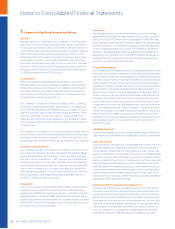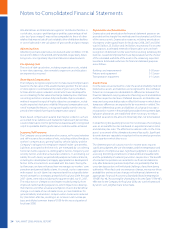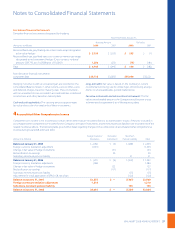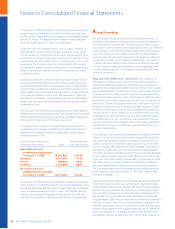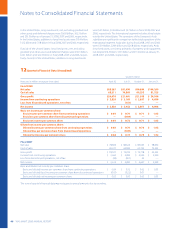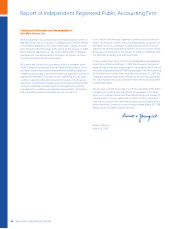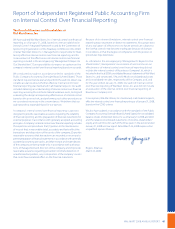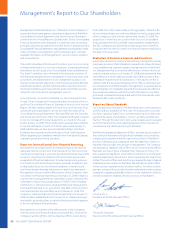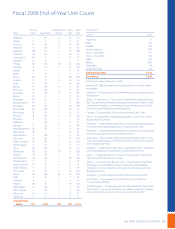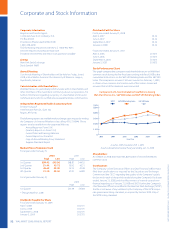Walmart 2008 Annual Report Download - page 44
Download and view the complete annual report
Please find page 44 of the 2008 Walmart annual report below. You can navigate through the pages in the report by either clicking on the pages listed below, or by using the keyword search tool below to find specific information within the annual report.
42 WAL-MART 2008 ANNUAL REPORT
Notes to Consolidated Financial Statements
As of January 31, 2008, there was $175 million of total unrecognized
compensation cost related to restricted stock rights granted under
the Plan, which is expected to be recognized over a weighted-average
period of 3.4 years. The total fair value of shares vested during the
scal year ended January 31, 2008, was insignicant.
Under the Plan, the Company grants various types of awards of
restricted (non-vested) stock to certain associates. These grants
include awards for shares that vest based on the passage of time,
performance criteria, or both. Vesting periods vary. The restricted
stock awards may be settled in stock, or deferred as stock or cash,
based upon the associate’s election. Consequently, these awards
are classied as liabilities in the accompanying Consolidated Balance
Sheets unless the associate has elected for the award to be settled
or deferred in stock.
During scal 2006, the Company began issuing performance share
awards under the Plan that vest based on the passage of time and
achievement of performance criteria. Based on the extent to which
the performance criteria are achieved, vested shares may range from
0% to 150% of the original award amount. Because the performance
shares may be settled in stock or cash, the performance shares are
accounted for as liabilities in the accompanying Consolidated Balance
Sheets unless the associate has elected for the award to be settled
or deferred in stock.
The fair value of the restricted stock and performance shares liabilities
are remeasured each reporting period. The total liability for restricted
stock and performance share awards at January 31, 2008 and January 31,
2007, was $125 million and $153 million, respectively.
A summary of the Company’s non-vested restricted stock and
performance share award activity for scal 2008 presented below
represents the maximum number of shares that could be earned
or vested under the Plan:
Non-Vested Restricted Stock and Weighted-Average
Performance Share Awards Shares Grant-Date Fair Value
Restricted stock and
performance share awards
at January 31, 2007 10,095,000 $47.38
Granted 3,114,000 47.29
Vested (688,000) 50.52
Forfeited (1,734,000) 48.34
Restricted stock and
performance share awards
at January 31, 2008 10,787,000 $47.00
As of January 31, 2008, there was $198 million of total unrecognized
compensation cost related to restricted stock and performance share
awards granted under the Plan, which is expected to be recognized
over a weighted-average period of 3.5 years. The total fair value of
shares vested during the scal years ended January 31, 2008, 2007
and 2006, was $24 million, $38 million and $20 million, respectively.
8 Legal Proceedings
The Company is involved in a number of legal proceedings. In
accordance with Statement of Financial Accounting Standards No. 5,
“Accounting for Contingencies,” the Company has made accruals
with respect to these matters, where appropriate, which are reected
in the Company’s Consolidated Financial Statements. The Company
may enter into discussions regarding settlement of these matters,
and may enter into settlement agreements, if it believes settlement
is in the best interests of the Company’s shareholders. The matters,
or groups of related matters, discussed below, if adversely decided
or settled by the Company, individually or in the aggregate, may
result in liability material to the Company’s nancial condition or
results of operations.
Wage and Hour “O the Clock” Class Actions: The Company is a
defendant in numerous cases containing class-action allegations in
which the plaintis are current and former hourly associates who
allege that the Company forced them to work “o the clock” or failed
to provide work breaks, or otherwise that they were not paid correctly
for work performed. The complaints generally seek unspecified
monetary damages, injunctive relief, or both. Class or collective-action
certification has yet to be addressed by the court in a majority of
these cases. Where it has been addressed, certification has been
denied in nine of these cases; has been granted in whole or in part
in eleven of these cases; and has been conditionally granted for
notice purposes in three of these cases. In another nine such cases,
certication was denied and the case was then dismissed, and in
two additional such cases, certication was granted and the case
was then dismissed. The Company cannot reasonably estimate the
possible loss or range of loss that may arise from these lawsuits,
except as noted below.
One of the class-action lawsuits described above is Savaglio v. Wal-Mart
Stores, Inc., a class-action lawsuit in which the plaintis allege that
they were not provided meal and rest breaks in accordance with
California law, and seek monetary damages and injunctive relief.
A trial on the plaintis’ claims for monetary damages concluded on
December 22, 2005. The jury returned a verdict of approximately
$57 million in statutory penalties and $115 million in punitive damages.
In June 2006, the judge entered an order allowing some, but not all,
of the injunctive relief sought by the plaintis. On December 27, 2006,
the judge entered an order awarding the plaintis an additional
amount of approximately $26 million in costs and attorneys’ fees.
The Company believes it has substantial factual and legal defenses
to the claims at issue, and on January 31, 2007, the Company led
its Notice of Appeal.
In another of the class-action lawsuits described above, Braun/Hummel
v. Wal-Mart Stores, Inc., a trial was commenced in September 2006,
in Philadelphia, Pennsylvania. The plaintis allege that the Company
failed to pay class members for all hours worked and prevented
class members from taking their full meal and rest breaks. On Octo-
ber 13, 2006, the jury awarded back-pay damages to the plaintis
of approximately $78 million on their claims for o-the-clock work and
missed rest breaks. The jury found in favor of the Company on the
plaintis’ meal-period claims. On November 14, 2007, the trial judge
entered a nal judgment in the approximate amount of $188 million,
which included the jury’s back-pay award plus statutory penalties,
prejudgment interest and attorneys’ fees. The Company believes it


